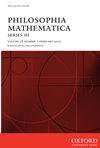数量、种类和识别问题
IF 0.6
1区 哲学
Q2 HISTORY & PHILOSOPHY OF SCIENCE
引用次数: 0
摘要
我为两个关于数词语义的论点辩护,比如“2”。首先,作为名词,它们具有分类学意义,因此它们描述或指称种类。其次,由于数字单数术语指的是数字,如果有的话,数字是种类。这两篇论文对数学哲学有几个重要的意义。例如,它们为Benacerraf的识别问题的复仇版本提供了自然且独立的解决方案。本文章由计算机程序翻译,如有差异,请以英文原文为准。
Numbers, Kinds, and the Identification Problem
I defend two theses concerning the semantics of number words, such as ‘two’. First, as nouns, they have taxonomic meanings whereby they describe or refer to kinds. Secondly, since numerical singular terms refer to numbers, if anything, numbers are kinds. Jointly, these two theses have several significant implications for the philosophy of mathematics. For example, they provide a natural and independently motivated resolution to a revenge version of Benacerraf’s Identification Problem.
求助全文
通过发布文献求助,成功后即可免费获取论文全文。
去求助
来源期刊

Philosophia Mathematica
HISTORY & PHILOSOPHY OF SCIENCE-
CiteScore
1.70
自引率
9.10%
发文量
26
审稿时长
>12 weeks
期刊介绍:
Philosophia Mathematica is the only journal in the world devoted specifically to philosophy of mathematics. The journal publishes peer-reviewed new work in philosophy of mathematics, the application of mathematics, and computing. In addition to main articles, sometimes grouped on a single theme, there are shorter discussion notes, letters, and book reviews. The journal is published online-only, with three issues published per year.
 求助内容:
求助内容: 应助结果提醒方式:
应助结果提醒方式:


